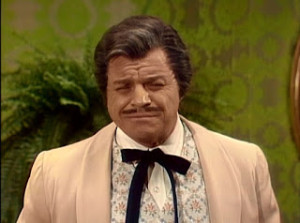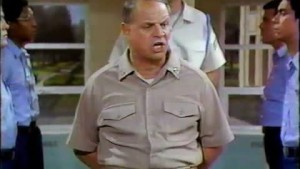STUDIO: Time Life | DIRECTOR: Bud Yorkin and others | CAST: Don Rickles
RELEASE DATE: 10/20/15 | PRICE: DVD$69.95
BONUSES: Rickles receives Legend award from TV Land, outtakes (second special), Johnny Carson invades the CPO Sharkey set, Sharkey reunion
SPECS: NR | 1240 min. | Comedy | 1.33:1 fullscreen | monoRATINGS (out of 5 dishes): Program
| Audio
| Video
| Overall
In this era of “trigger warnings” for un-p.c. language, behavior and ideas, it’s hard to imagine a time when a stand-up comedian appeared on television making fun of every studio audience member based on his or her race, age and appearance. Don Rickles was (and is, since he still periodically does live performances and guests on late-night talk TV) a show business institution, thanks to rapid-fire insults that encompass the whole human race — he also takes care to slam white people, Jews and older men (his personal demographic).
Watching the contents of the eight-disc box Mr. Warmth! Don Rickles: The Ultimate Collection, one is reminded of how viewers patiently sat through sketches featuring Rickles, his pleasant (but tedious) banter with other stars and even his occasional forays into singing and dancing, in order to hear him let loose on members of his audience. Rickles is a master of “crowd work” — in fact it’s his entire act (the awkward musical interludes and serious “just kidding” speeches aside). In the four variety specials and one sitcom included here, we see the best and worst of Rickles, his sharpest and nastiest (and most hysterical, depending on your point of view) insults, and his most mawkish interludes — anyone for a full, heavily dramatic scene from Inherit the Wind with Don as an unfriendly witness being quizzed by lawyer Jack Klugman?
The sitcom is enjoyable (more below), but the real draw here is the group of the variety specials (the first two can now be bought separately as The Don Rickles TV Specials: Volume 1). Each one contains several jaw-dropping moments — some because of Rickles’ insults, other because they belong to that sacred (for classic TV and nostalgia buffs) category of moments that inspire a “who thought *this* up?” reaction.
From the very first moments, The Many Sides of Don Rickles (1970) shows the writers and director trying to figure out how to showcase Don. While anyone could’ve told them “just show the crowd work,” here Rickles is featured in oddly flat “behind the scenes” moments talking with his guest stars (Don Adams, Harvey Korman, and Robert Goulet). Then we see him in a variety of guises — scripters either capitalized on his obnoxious persona by having him play a rage-aholic or had him play against it, as a milquetoast character.
Despite the talents who worked on this show — Gail Parent, Kenny Solms, Pat McCormick and Jack Riley scripted; Bud Yorkin directed — the only non-crowd work segment that impresses is a stunningly lengthy sketch about a hippie guru (Korman) who is conducting encounter sessions that are really orgies.
Don Rickles: Alive and Kicking (1972) offers Rickles’ characteristically quick, nasty-but-funny putdowns of the audience, interspersed with musical numbers (guest Juliet Prowse does Elton John’s “Honky Cat”; Don plays Fred to Prowse’s Ginger) and feeble sketches (Don plays the mild-mannered husband to sexpot Anne Meara).
The third special, Mr. Warmth (1975), is a mindblower for two reasons: its crowded guest roster and the fact that nearly the whole show is offered up in uncut form as supplements on the disc. The latter includes some moments that were dropped, including Rickles’ seemingly endless tribute to his childhood idol James Cagney. The guest list, though, is a testament to both Rickles’ status as a favorite performer of many legendary stars, and his producers’ decision to surround him with the best character comics of the era.
Thus show-biz fanatics will be fascinated by Rickles playing straight man for “the Masked Comic” — John Wayne in a Lone Ranger eye mask — and having his singing mocked by a friend (billed here as “Francis Albert Sinatra”). Those segments are eye-openers, but for fans of Seventies variety shows (like this reviewer) the single most impressive segment finds Rickles as an airline employee trying to pacify various strange passengers: Georgie Jessel (incarnated by Charlie Callas), a Southern gentleman (Barney Miller’s Steve Landesberg), the inimitable Rip Taylor (replete with props) and the man with the most unique and singularly repetitive act in entertainment history, Billy Saluga (“Oh, you doesn’t has to call me Johnson…”).
The final primetime network special, Rickles (also ’75), rivals its predecessors for odd guest appearances. The entire show is pretty odd to boot: Don is watched by his alter-ego (a split-screen Rickles) who criticizes his act and eventually travels to Heaven (encountering Arthur Godfrey as St. Peter) and Hell (Jose Ferrer as the Devil, who likes Don’s act). Somehow the Inherit the Wind sequence is shoehorned into the proceedings.
Before he visits the afterlife and the special becomes a rather badly scripted Theater of the Absurd play, we are treated to an epic version of Don’s theme song, in which he sings and tap dances while telling us he’s not so bad in Rat Pack-ian couplets (“I’m a nice guy/in spite of what you’ve heard/I’m a nice guy/you can bet your little bird”). Here, he is joined by other “nice guy” villains — Jack Palance, “Hot Lips” and “Frank Burns” from TV’s M*A*S*H, tennis pro Bobby Riggs, Otto Preminger (!) and a person dressed as a shark (it’s Jaws time, folks).
As if that wasn’t enough to make the head of any pop-culture aficionado spin, the most stunningly strange segment is a bit that Rickles did for many years onstage (and is seen doing in an earlier special here), in which he would pick audience members to help him act out a ridiculous and racist Native American campfire sketch. Since the segment is a dismal idea no matter how you cut it, it is made tolerable here by the guests Rickles chooses to act in it: Elliott Gould, James Caan and Michael Caine (doing promotion for the big flop Harry and Walter Go to New York).
The specials are compellingly watchable because of un-p.c. nature of Rickles’ comedy (the only comedian currently doing his kind of take-no-prisoners insult shtick is Lisa Lampanelli). That humor was present in a diluted, family-friendly way in CPO Sharkey (1976-77), Rickles’ only somewhat successful TV series. The show is pleasant, but pales in comparison to its obvious inspiration, The Phil Silvers Show (aka “Sgt. Bilko”).
The show’s creator was Aaron Ruben, who wrote for Bilko and co-created another model for Sharkey, namely Gomer Pyle. Ruben utilized Rickles’ stage persona quite well by making his lead character a cranky but lovable Navy “lifer” who was often bested by others, including a woman officer (Elizabeth Allen) and an African-American assistant (Harrison Page).
The show is entertaining, but it truly reaches the level of mind-blowing camp when the characters interact with contemporary music. The first instance, an episode called “Sharkey Boogies on Down,” features a visit to a local disco, during which Rickles indulges in a truly crazy solo dance routine. Even more sublime is “Punk Rock Sharkey” in which the CPO helps out a runaway (Lisa Mordente) who has fled her mother (Charlotte Rae) to find a new life in the punk community (which she describes as “concept art,” “pogo,” and “new wave” — meaning the scripters threw in as many terms as they could find in newspaper articles).
The box set includes several interesting supplements, but those included with the Sharkey episodes are the most memorable, as we are treated to the famous moment when Johnny Carson mock-stormed onto the sitcom set to complain to Rickles about his broken cigarette box. There is also a newly shot reunion of the sitcom cast members, who meet with Rickles (who now has difficulties walking) in Las Vegas. The talk is very light, but it’s most interesting to hear that Rickles used to joke with them about which plot elements they were acting out had come from Gomer Pyle and which had come from Bilko.
What is most interesting about the Mr. Warmth box is that there is a “trigger warning” disclaimer on the back of the collection, as well as on the individual DVD boxes. This warning seems aimed at those who are unfamiliar with Rickles (who are unlikely to fork over 70 dollars for a comprehensive box of his TV work). Those who grew up with Rickles on the tube are most likely not going to be offended by his insults. Curiously enough, they will most likely end up wincing at the “we’re all brothers” speeches he felt compelled to make at the end of his crowd work (and his singing).
|
Buy or Rent Mr. Warmth! Don Rickles: The Ultimate Collection
|
|||
|---|---|---|---|
 |
|||


Leave a Reply